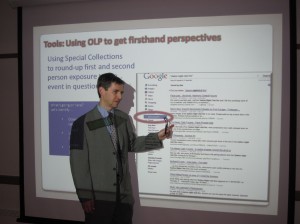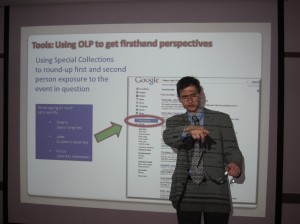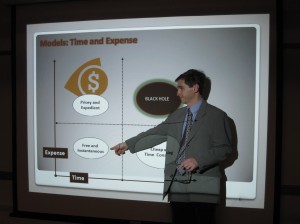[/caption]
Remember the roaring nineties? E-verything was e-commerce e-xuberence. A dotcom domain was a license to go public. Actual customers and products were exempted from establishing share prices on a uniquely American vintage of snake oil.
One of the other vestiges of the NASDAQ bubble was the notion of Internet time. This was the tagline update for an economy that never sleeps. No one wanted to have fallen prey to the old familiar PE ratios or even acknowledge that old school thinking had any sway on emerging business models.
The financial services supply chain was no longer tangible. But at least it was still intelligible -- no? Okay, we settled for legible back then in those bulging Internet-based portfolios. Then came the spook show of 2001 and these notions were beaten into weightlessness -- not by regulators but the laws of financial gravity. Only then did the Worldcoms, Enrons, Tycos, etal. spiral away from shareholders, employees, and other interdependent life forms on planet money.
Losing Track of Internet Time
In the Dotcom era, complacency became the new taboo. You could be going nowhere. You could be revving over-funded engines off cliffs of falling cash flows. Just no two-hour lunches, man. The alarm clock had rung and the snooze bar was jammed. Every day we were told how “hot” companies and “cool” products were intensifying established markets or creating new ones:
- How hot?
- How cool?
- How intense?
It didn't much matter. There were so many winners in this most generous of competitions. Angel investors were flipping start-ups. The Feds sat in a corner. Stagnation was abolished. Companies simply grew or died. Both experiences were nearly instant.
All comers were out for one thing: to please the 'mother-of-all networks' as the nurturing vessel and growth serum. That was no Goodyear Blimp. That was a gaggle of rippling packet switches so enmeshed it eclipsed all television, telephony, and satellite networks combined. Remember all meeting there for the first time? Meeting anywhere else would never be the same.
Who in 1994 could have predicted that within 5 years desktop "searching" would become as cheap and pervasive as mouse pads and screen savers?
What's a screen saver?
The truth is that Internet Time has done the unthinkable. It has frozen our cluttered calendars in their tracks. How do I know? I woke up from my millennial hangover this morning and witnessed a miracle. We now have all the time in the world. I say that because online is no longer a useful distinction for defining offline. There's now only the folks who have severed the signal and the rest of us.

And how about that most favored time = cost factor ... the biological father of all business metrics? On Internet Time information wants to be free. Our calendars are not free at all but we're willing to spend untrackable hours tackled by our own fruitless searches. The paradox is astonishing. Information from the web is as plentiful as it is free and we still pay through the nose. How?
All-you-can-drink access has gone from flirtation, to utility, to civil liberty. So too the search engine as social moderator means that we only pay cash for pushing merchandise or pulling it in. That leaves a whole lot of intangible inventory around shopping for ideas, buying arguments and paying with our limited attentions as well as wallets. But it's easier to spend all that unlimited attention on people-watching than self-educating and acting on what we learn.
The last time I set my alarm clock I never heard it go off. Or perhaps it had never stopped ringing? Next time you research, Google like you paid for it.
[caption id="attachment_587" align="alignright" width="240" caption="Last week's kickoff of Online Investigations for Pioneer Valley Professionals"]
 [/caption]
[/caption]



No comments:
Post a Comment